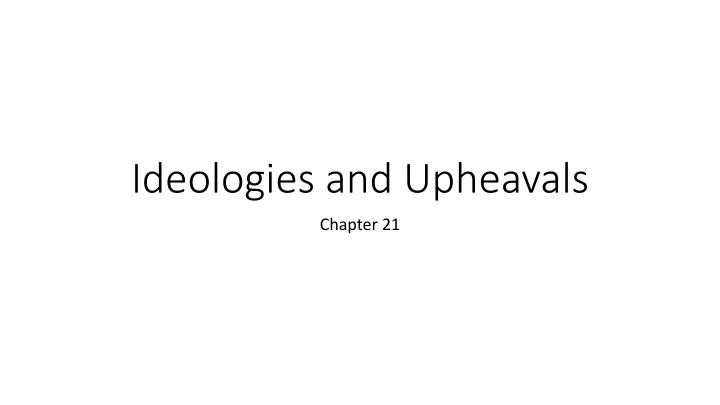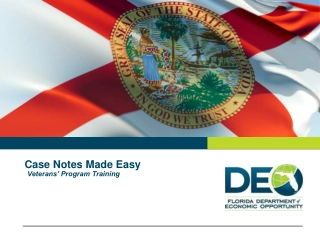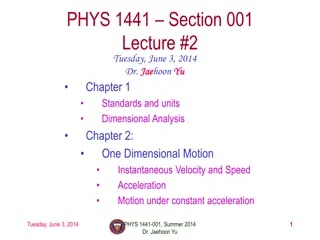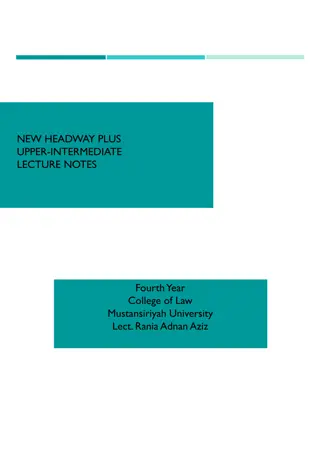Ideologies and Upheavals: Congress of Vienna and Impact
The Congress of Vienna, a gathering of key European powers, aimed to establish lasting peace after Napoleon's defeat. Key agreements included territorial compensation, restoration of monarchs, and the formation of the Holy Alliance. While successful in preventing major wars, the Congress lacked foresight on issues like nationalism and liberalism. The dominance of conservative ideologies, led by figures like Metternich, shaped post-Napoleonic Europe.
Download Presentation

Please find below an Image/Link to download the presentation.
The content on the website is provided AS IS for your information and personal use only. It may not be sold, licensed, or shared on other websites without obtaining consent from the author.If you encounter any issues during the download, it is possible that the publisher has removed the file from their server.
You are allowed to download the files provided on this website for personal or commercial use, subject to the condition that they are used lawfully. All files are the property of their respective owners.
The content on the website is provided AS IS for your information and personal use only. It may not be sold, licensed, or shared on other websites without obtaining consent from the author.
E N D
Presentation Transcript
Ideologies and Upheavals Chapter 21
The Congress of Vienna The Congress of Vienna: A meeting of the Quadruple Alliance - Russia, Prussia, Austria, and Great Britain, restoration France, and smaller European states. Goal to create a general peace settlement after the defeat of Napoleon s France in 1814. How do you ensure lasting peace across Europe?
Balance of power Quadruple Alliance agree to territorial compensation. Russia accepted a smaller Poland Prussia gets smaller Saxony What about France? Ends France s diplomatic isolation. Fined 700 million francs (thanks Napoleon ) Military occupation for 5 years Agreement to meet periodically Beginning of the Congress System
Intervention & Repression Holy Alliance: An alliance formed by the conservative rulers of Austria, Prussia, and Russia in September 1815. Became a symbol of repression of liberal and revolutionary movements. Restored monarchs in Spain and the kingdom of the Two Sicilies Klemens von Metternich (1773-1859) Austrian foreign minister from 1809-1848 Policies dominated central Europe until 1848 Carlsbad Decrees (1819)
Impact of the congress of Vienna Using the secondary source comparison by Holborn, answer the following question: Give TWO reasons for the success and TWO reasons for the failure of the Congress of Vienna settlement. Arguments for success: Wars after 1815, but none of them was a war with all/most European states Wars did not upset the European political system (power balance) Arguments for failure: Lacked foresight in future issues of nationalism & liberalism All representatives were Conservative (only get one side of the argument) Great Britain chooses isolation rather than intervention
Conservatism Conservatism: The idea that change should come slowly, if at all. Social Class(s): Aristocracy/Landed Gentry Political: Preserved a blend of hereditary monarchy, a strong and privileged landowning aristocracy, an official church and traditions common to pre-1789 Europe Economic: Favored by the landed gentry who supported the advantages of their status. Generally supported mercantilism Social: It was founded on the preservation of respectful commoners Klemens von Metternich
Liberalism Liberalism: Freedom = absence of constraint presence of opportunity Social Classes: Bourgeoisie (Professional Class) Political: Generally favored individual freedoms, and constitutions. Promoted limited suffrage (avoid the mob). Supported Nationalism Economic: Emphasized property rights and laissez- faire economics (against mercantilism) Social: Drawn mostly from the middle class, they favored advantages of the aristocracy and prompted education a means for social improvement. Adam Smith
Nationalism Nationalism: Radical idea that developed after 1815. Success of Western nations stimulated other peoples to become unified. Social Classes: All Political: The idea that people of the same language, religion, ethnicity, or heritage should have their own government on their own land. Economic: A country must develop its own industries to protect its culture. Tariffs are important for protection. Social: Cultural identify & feelings of national superiority Giuseppe Mazzini
Socialism Louis Blanc Socialism: Radical doctrine after 1815 that began in France Social Classes: The working classes Political: Idea that government for manage the economy for the good of the people Economic: Opposed laissez-faire that mistreated workers. Believed that private property should be limited. Social: Reorganize society to establish a new sense of community (public works, and improved conditions for the poor) Count Henri de Saint-Simon
Marxism Karl Marx Marxism: Working-class revolution to overthrow capitalist society. Social Classes: The Working Class (Proletariat) Political: Class loyalty over nationality. Bourgeoisie will devour each other, and the workers will take over remaining bourgeois. Dictatorship of the proletariat Economic: True freedom would occur when private property was abolished. Social: The theory held that a classless society would result from this revolution. The state and religion would disappear with the death of the middle class. Friedrich Engels
Romanticism Romanticism: artistic movement (1790-1840s) that revolted against classicism and the Enlightenment. Belief in emotional exuberance, unrestrained imagination, and spontaneity. Social Class: Authors, artists, and poets Political: Emphasized studying the past. Could be liberal or conservative. Economic: Rejected materialism & saw industrialization as an attack on nature. Social: Movement focused on emotion, the supernatural, nationalism, historical themes, true love, and death. Liberty Leading the People Delacroix
Liberal Reform in Great Britain Corn Laws: British laws governing the import and export of grain. 1815: laws benefitted the aristocracy, but made food prices high. Reform Bill of 1832: increased male voters by 50%. House of Commons most important legislative body. The People s Charter 1838 Competition for support of the working class ensured peaceful evolution in Great Britain.
The Great Famine Irelands population increased from 3 million to 8 million between 1725-1840. 1.75 million immigrate to the U.S. by 1840 The Great Famine: Four years of potato crop failure (late 1840s) 1.5 million died/were not born Irish population cut in half by 1911 Anti-British feelings intensified Nationalism promoted reform campaigns and call for independence.
Revolutions in France (1830) Louis XVIII (r. 1814-24) Constitutional Charter: Liberal constitution, but denied universal male suffrage. Charles X (r. 1824-30) Pushed to reestablish the old order in France Revoked charter, stripping voting rights and limiting free speech Revolts in Paris overthrew government Louis Philippe (r. 1830-48) King of the People Disappointment to reformers (only promoted minor changes)
National Liberation In Greece Historical Background: During the 18th century, Greeks living in exile began to appeal to their fellow Greeks to free themselves from Ottoman rule. Greek nationalists urged Greeks living throughout the Balkans and Asia Minor to revolt against their Turkish Muslim rulers. An uprising in March 1821 began a nine-year war for independence. Several thousand European volunteers fought on the Greek side, while many more (known collectively as Philhellenes lovers of Greece ) raised money and spread pro-Greek views in Europe. Intervention by Russian, French and English forces in 1827 and 1828 ultimately forced the Turks to grant Greek independence, which was formally established by a multi-power treaty in 1830. Prompt: Analyze the ways in which various people viewed the character and condition of Greeks in the Ottoman Empire during the Greek movement for independence in the eighteenth and early nineteenth centuries.
The Revolutions of 1848 Late 1840s Europe saw period of tense political & economic crisis. Continental distress (poor harvests) Stagnant incomes Rise in radical ideologies revolts Full-scale revolution began in France (Feb. 1848) Untouched: GB, Belgium, the Netherlands, Russia, and Ottoman Empire. Push for independence & liberal democratic constitutions.
Revolts of 1848: A Failure? Yes Existing order intact: Upper Bourgeoisie controls western Europe, middle class failed to get control of central Europe Political map of Europe unchanged
Revolts of 1848: A Failure? No Working class emerges as claimant to power and egalitarian trends increased Thousands emigrate to US and help create a new society
Why do people hate the bourgeoisie? A swing group, balanced between elites and workers. After the Revs. of 1848 they consistently ally with elites to protect property against radical political and social movements. This class benefits from industrialization and turns their back upon the class from which they rose. Louis Philippe evolving into a pear. Daumier cartoon satirizing his loss of prestige























